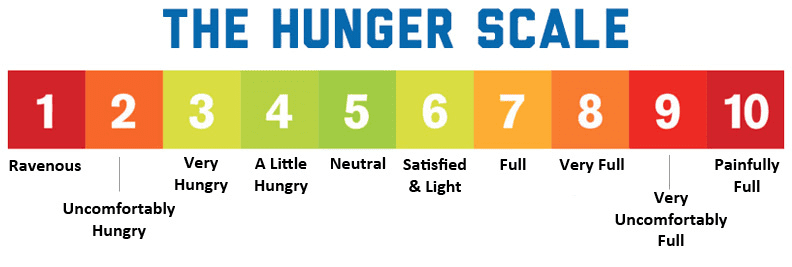If you’re ready to stop stressing about food and make peace with your body and food choices, then intuitive eating was made for you. More and more people embrace an intuitive eating approach that says “no thanks” to fad diets and “yes please” to listening to your body.
Interested in adopting an intuitive eating approach for yourself? In this article, we break down/interpret the ten principles of intuitive eating — and how you can put them into practice in your everyday life.
- Reject the Diet Mentality
What it means: It’s time to get angry at diet culture. For years, we have allowed corporations to dictate our self-worth while they profited off the photoshopped magazines, diet plans, and exercise DVDs we purchased. Intuitive eating means saying “enough is enough” to the commercialization of weight loss.
How to do it: Throw away any diet books, workout DVDs, or magazines that promise to help you lose weight quickly and easily. Anything that makes you feel bad about your body or your self-worth has no place in intuitive eating.
- Honor Your Hunger
What it means: “Fad diets,” tell us to ignore our body’s natural hunger cues, like a rumbling tummy or shaking hands. Instead, we’re supposed to count backward from 100, chug a bottle of water, or do anything to distract ourselves from our hunger. One of the many problems with this approach is that it can trigger our desire to overeat.
Intuitive eating means rediscovering your body’s hunger and fullness cues, learning to eat when you’re hungry, and stop when you’re full.
How to do it: Get to know the hunger scale, which ranges from 1 to 10: 1 means “I could eat a horse,” while 10 means “Thanksgiving dinner-level full.” Make sure you always eat before you get to 2, “uncomfortably hungry,” and consciously decide how full you want to feel (from 6 to 10) when you sit down to every meal.
- Make Peace With Food
What it means: Labeling foods as “good” or “bad” backfires by designating certain foods as “forbidden fruits.” When you tell yourself you’re not allowed to have a particular food, it automatically triggers intense cravings that eventually become impossible to ignore. Eventually, we end up binging and feeling terrible about ourselves, only to swear off all “bad” foods….and start the cycle all over again. Intuitive eating means interrupting this cycle by removing the moral value from food.
How to do it: Give yourself permission to eat what you want, when you want. Some people fear that this will lead them to spiral “out of control,” but once you remove the labels from food, you give yourself the freedom to make conscious choices about what you want to eat, when you want to eat it, and why.
Listen for body signals that tell you that you are full. Take a break in the middle of eating and ask yourself, “how does the food taste? Whats your hunger level now?”
- Challenge the Food Police
What it means: The “food police” is that voice in your head that monitors whether what you’ve eaten is “good” or “bad.” It tells you to punish yourself with intense exercise or starvation when you’ve overindulged and to pat yourself on the back when you’ve stuck to strict rules. Intuitive eating means silencing that voice once and for all.
How to do it: Interrupt thoughts that say you’re “good” for eating carrot sticks and “bad” for eating chocolate cake. You can do this by thinking the word “stop” or picturing a stop sign in your head when you have those thoughts. Over time, you’ll be able to retrain your brain to no longer ascribe moral value to food, and just know what is healthy for you.
- Discover the Satisfaction Factor
What it means: In our quest to adhere to diet culture rules, we often forget the pleasure and joy that food can bring. It’s time to rediscover the satisfaction factor in food by getting back in touch with the parts of ourselves that experience deep emotion when we eat certain foods. Intuitive eating means it’s okay to eat emotionally, as long as you have other coping mechanisms in your toolkit.
How to do it: Think of the foods you used to enjoy when you were little, before you learned that certain foods were “off-limits.” Is there a special recipe your grandmother used to make, or a favorite holiday cookie you haven’t eaten in years? Make the decision to say yes to and savor the happiness found in these foods, instead of denying yourself the pleasure of them.
- Feel Your Fullness
What it means: When we eat the way diet culture tells us to, we often don’t pause to savor our food. Instead, we’re scarfing down a bowl of raw kale salad in front of the television while multitasking on our cell phones. Intuitive eating means stripping away the distractions and giving your full attention to your food.
How to do it: Turn off the TV, put down the cell phone, and focus on your plate. Really savor the taste and texture of your food. Pause every couple of bites to assess your hunger and fullness level quickly. Commit to stopping when you get to the feeling you desire. Once you’ve done this for a few meals, it will become more natural, and you won’t have to think about it to this extent.
- Cope with Your Emotions with Kindness
What it means: Restricting foods isn’t a solution for emotional eating. That being said, food can’t be your only coping mechanism. While a bowl of ice cream or a mug of hot cocoa can play an important role in getting over a breakup or a bad day at work, it’s critical to have other ways of coping with anxiety, loneliness, and other difficult emotions. You can respond to your emotions with kindness and compassion and not use food to numb the pain with intuitive eating.
How to do it: What emotions trigger you to binge? Create a list of coping mechanisms you can use when you feel these emotional triggers. For example, if boredom leads you to overeat, you could read a book, go for a walk, visit your favorite coffee shop, or call a close friend or family member to chat. Failure to plan is planning to fail, so make sure to plan for all potential triggers.
- Respect Your Body
What it means: You cannot eat intuitively if you do not love and trust your body. That means trusting your body’s set-point weight. Your body will settle in at its optimal weight when you are eating intuitively. This weight is shaped by much more than food and exercise, including uncontrollable factors like genetics. Intuitive eating means accepting your body for what it is instead of relentlessly trying to change it.
How to do it: All bodies deserve to be loved and respected. Stop criticizing and hating your body, and instead strive for, at the very least, body neutrality. Bodies aren’t good or bad.
- Movement
What it means: When you’re in the throngs of diet culture, exercise is a way to manipulate your body into being a certain shape or size. However, when you’re eating intuitively, exercise is a way of finding joy and taking care of your body’s health. Intuitive eating means letting go of the idea that exercising is exclusively for burning calories and finding a way to move that you genuinely enjoy.
How to do it: Focus on how working out makes you feel, rather than the way it makes you look. Does going for a run give you more energy? Make your skin glow? Boost your mood? Remind yourself of these benefits, rather than burning fat or calories, the next time you don’t feel like hitting the gym.
- Honor Your Health
What it means: Diet culture tells us that every bite counts towards our overall health. However, at the end of the day, you won’t gain or lose significant weight, or ruin a lifestyle from a single meal. Intuitive eating means choosing progress by honoring both your hunger and your health.
How to do it: Embrace the concept of balance. You can still make nutritionally-informed choices about what to eat while consciously choosing not to deny your body’s cravings. For an intuitive eater, both leafy greens and ice cream can be part of a healthy diet.







